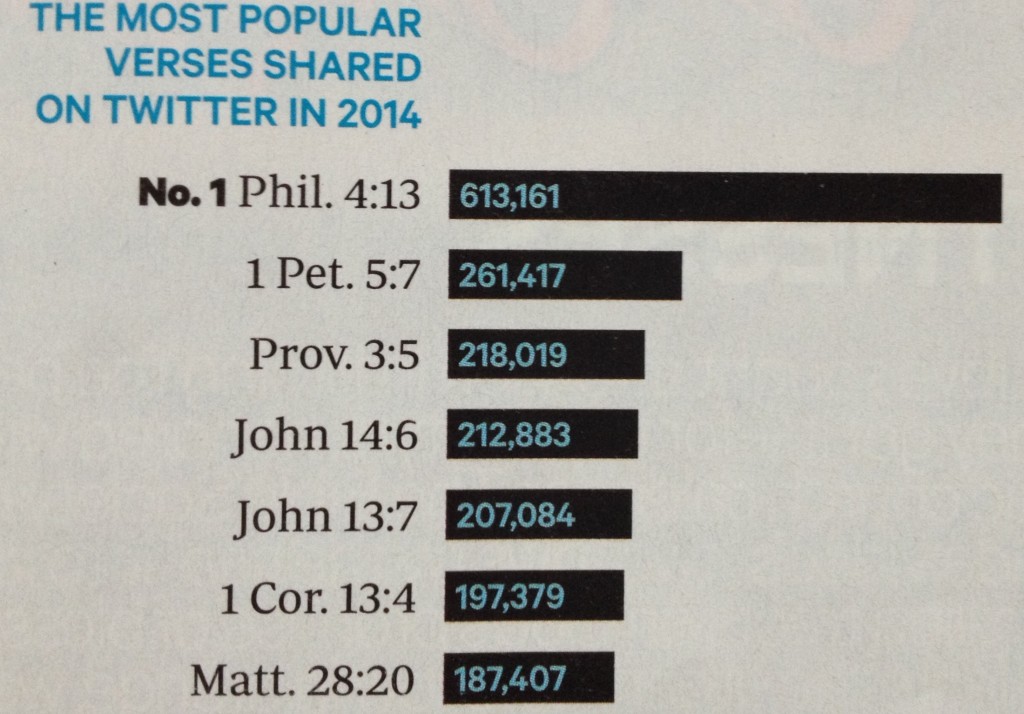Top (Mis?)Quoted Verses of 2014
Christianity Today recently listed “The Most Popular Verses Shared on Twitter in 2014.” Here are the winners:
Interestingly, the top four verses have an honor-shame nuance that common interpretations typically filter out. A quick look at these 4 verses provides a window into the honor-shame setting of key biblical verses, and it illustrates some subtle ways scripture is misinterpreted.
Philippians 4:13—“I can do all things through him [Christ] who strengthens me.” This verse often gets read as “I can accomplish all things…” So, I can win the game, make the sale, get the job, launch the successful ministry…through Christ who strengthens me. As a task-oriented, doing-focused culture, we love that little word “do” in this verse. Phil 4:13 is a divine imprimatur for our busyness. But for Paul, the idea was more, “I can endure all things…” Specifically, Paul could withstand the stigmatizing trials of jail and hunger because “it is my eager expectation and hope that I will not be at all ashamed, but that with full courage now as always Christ will be honored in my body, whether by life or by death” (Phil 1:20).
1 Peter 5:7—“Cast all your anxieties on him, because he cares for you.” “Looking for a new home, applying for college, worried about work situation? Then…cast your cares on him!” While God most certainly cares for our financial, physical, and material anxieties, the book of 1 Peter focuses on the social anxiety caused by shaming persecution. The verse is actually a dependent clause explaining the previous verse. “Humble yourself, therefore under the mighty hand of God so that at the proper time he may exalt you, (by) casting all your anxieties on him.” The audience of 1 Peter endured tremendous persecution and shame from the majority culture for following Jesus. The letter helps them to faithfully endure that cultural shame by reminding readers they will be honored by God. They sensed anxiety about their role and status in society amidst the persecution, hence the exhortation to remain humble and trust God for exaltation, instead of retaliating to restore their own reputation. “Yet if anyone suffers as a Christian, let him not be ashamed, but let him glorify God in that name” (1 Peter 4:16).
Proverbs 3:5—“Trust in the Lord with all your heart, lean not on your own understanding.” A proverb by nature is a stand-alone aphorism; you can’t really “read it out of its context” because proverbs don’t have much of a context. Nevertheless, this proverb immediately proceeding it is worth noting for its honor-shame language—“Do not let loyalty and faithfulness forsake you…so you will find favor and good repute in the sight of God and of people” (Prov 3:3-4). That is to say, as we demonstrate relational commitment and group allegiance to others, we will acquire honor in the eyes of God and others. Even when we understand biblical verses correctly, there is the inevitable tendency to prioritize particular verses over others–Proverbs 3:5 was tweeted 87 times more than Proverbs 3:4. It is possible for someone to have 20/20 vision, but at the same time be limited by tunnel vision (hermeneutically speaking).
John 14:6—“I am the way, the truth, and the life. Nobody comes to the Father except through me.” This is read as proof of the exclusivity of Jesus Christ for eternal salvation. That is entirely true, but stops short of Jesus’ full meaning. Jesus’ teaching in John 14-17 is preparing the Jewish disciples to live without him. Jesus knows there will be persecution and pressure for them to return to the synagogue (12:42; 16:2), and the twelve will face temptation to place their hope back in the agenda and aspirations of Israel for arriving at the Father’s kingdom. So with these words, Jesus challenged Israel’ fundamental narrative regarding herself, and invited the disciples to adopt a new metanarrative regarding ethnic Israel’s role in God’s purposes. In other words–Jesus, not Israel, is the true way to experience God’s kingdom life. The verse is designed to summon the disciples to be loyal to Jesus and guide their behavior amid impending distress/expulsion from the community.
Conclusion
I’m not trying to be an exegetical curmudgeon here. The common understandings of all these verses are well within the acceptable bounds of plausible interpretations and applications of the original means—no doubt. Moreover, these are great verses that should be quoted and tweeted—no doubt.
Yet, we must be aware of how our culture/theology subtly nuances and unknowingly overlooks aspects of the Bible that can speak powerfully to the heart of Majority World cultures.
And if this happens in these four Bible verses, does it also happen with biblical ideas such as “Law,” “sin,” “salvation,” “grace,” “Messiah,” and even, “God”?


WOW … this is so good. Thank you!